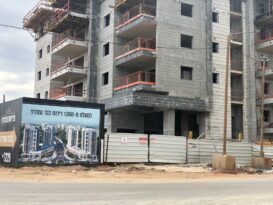Going to the polls for the fourth time in two years will likely have a significant impact on the Israeli residential real estate market. The political instability increases the chances that the housing prices will continue to rise while making it more difficult than usual for the government to respond. Additionally, a major reform that aims to speed up the process from planning to building will likely be thrown out the window.
Last week, the short tenure of the 23rd Knesset came to an end after a series of failed attempts to approve the 2020 State budget. For the fourth time in two years, on March 23, 2021, the Israeli public is expected to vote for its representatives in a general election. As a result, the current government has become an “interim government,” limiting its ability to make decisions that affect existing policies. This political chaos will impact all areas of life in Israel, including the residential real estate market, which recent governments have tried to stabilize over the past decade.
The following are the 5 main effects of the upcoming election on residential real estate in Israel:
1. The interim government will be unable to thwart a sharp rise in residential real estate prices.
Over the past few months, multiple factors have developed which could lead to a sharp rise in housing prices in the near future. Last July, the government reduced the first tier of the purchase tax for apartments bought for investment purposes from 8% to 5%, resulting in an increase in the demand for apartments in Israel. In addition, the Bank of Israel has announced a reduction in mortgages beginning in January 2021, which is also expected to increase demand in the residential real estate market.
However, the new year will probably see a significant decrease in the supply of new apartments. According to data from the Israel Land Authority, the body that manages State lands (which constitute 93% of Israel’s total area), the amount of land marketed for construction in 2020 dropped drastically
The combination of an increase in demand and a decrease in supply may lead to a jump in apartment prices in the next three months leading up to the elections. In the event of such a scenario, the interim government will not have the authority it needs to make significant policy changes to stabilize the residential real estate market.
2. The shortage in new apartments may become more critical
Even before the announcement of the upcoming elections, the housing sector in Israel was in a precarious state, lacking a responsible “landlord” who could outline policy and ensure its implementation. As Israel prepares to go to the polls, this situation in the residential real estate market will only worsen.
The most recent politician to place housing at the forefront of Israel’s national agenda was former Finance Minister, Moshe Kahlon. When his party, Kulanu, merged with Likud following the April 2019 elections, this role was not filled by anyone else – not even the current Housing Minister, Yaakov Litzman, whose tenure was short and ineffective.
Just as students tend to misbehave when there is a substitute teacher, government bodies do not function at their best without a permanent supervisor. An analysis of the statistics from the Israel Land Authority illustrates this point clearly. In 2019, a year in which two elections were held, land marketing output fell by 10%. With the added impact of the Covid-19 pandemic, an even more dramatic decline is expected in 2020. Now, as the country prepares for new elections, it is safe to assume that the organization will continue to be dysfunctional for the first half of 2021, which will lead to a continued decrease in the supply of apartments.
To summarize, not only will the issue of insufficient supply continue to impact the residential real estate market in the coming years, but it will probably get worse. Meanwhile, it will become more complicated for the government to solve the problem. This reality may lead to rising apartment prices in both the short and medium term.
3. The reform that aimed to streamline the construction process will be put on the backburner.
Just under a month ago, on December 1, the Ministry of Justice published the details of a significant amendment to the Planning and Building Law. One of the central goals of the proposal was to replace the existing planning and licensing procedures, which currently take many years, with a more efficient and streamlined process that would add more residential units to the real estate market.
Now, with the run-up to the upcoming election, it is unclear whether or not the next government will adopt the reform. At best, there will be a delay of several months in approving the reform; at worst, it will be tossed out the window.
4. The current Tama 38 plans will likely be extended.
One of the main sections of the aforementioned reform was the approval of a new urban renewal plan to replace the current one, known as Tama 38, which is set to expire in October 2022. With a shortage of building plots and a rapidly increasing population in Israel, urban renewal projects are heavily depended upon for increasing the supply of residential units in the Israeli real estate market.
As explained above, it is now unclear whether or not the new law will be adopted. Even in the best-case scenario, it will be significantly delayed. Since it is hard to believe that the government will allow Tama 38 to end without approving an alternative plan, it is likely that Tama 38 will be extended for at least another year beyond its original expiration date.
5. The brand new subsidized housing program may be in jeopardy.
Just three weeks ago, Housing Minister Yaakov Litzman officially launched the new subsidized housing program, after receiving final approval from Finance Minister Israel Katz. According to the plan, the Israel Land Authority will publish land tenders for residential construction to developers, with the terms ensuring that a portion of the apartments will be offered at a significant discount to first-time home buyers.
Katz’s approval of the plan allowed the Israel Land Authority to issue tenders for the first thousand apartments in the initiative, but even before the ink dries with Katz’s signature – it already seems that the days of the initiative are to be numbered. The next Minister of Housing, who will probably be appointed in late April-early May, will most likely nullify or amend the plan, as it is extremely rare for a new minister to carry out an existing policy, especially one registered in his predecessor’s name. Ultimately, the chances of the plan surviving depend on whether the name of the Minister of Housing in the new government will be Yaakov Litzman.
In conclusion, heading to the polls again leaves the residential real estate market with all the conditions for a price increase, while the opportunity for first-time buyers to purchase subsidized apartments appears to be very limited. The only people who may benefit from the situation are those buying apartments for investment purposes. The outgoing government has encouraged investment with policies ensuring favorable terms for financing and taxation for the near future.






